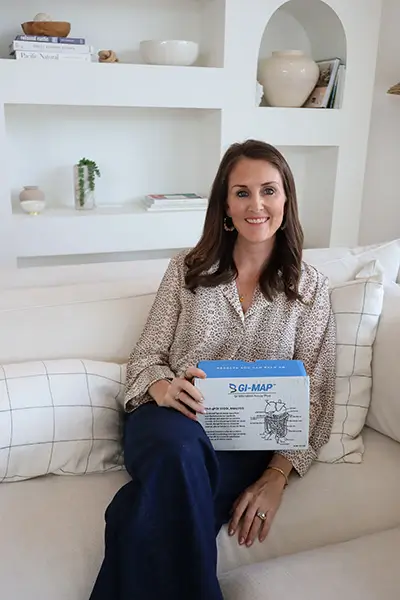It’s normal to shed some hair after having a baby, but when clumps start showing up in the shower or your ponytail feels half its size, it can be alarming. Most women are told it’s just hormones or to give it time, but that’s not the full story. Hair loss after pregnancy is often your body’s way of saying it’s depleted and needs rebuilding from the inside out.
This is where minerals come in. Restoring your body’s mineral stores after pregnancy can be one of the most overlooked yet effective ways to slow shedding, boost energy, and feel like yourself again.
Why Hair Loss Happens After Pregnancy
After birth, your hormone levels shift dramatically while your body works to recover, nurse, and care for a newborn. Add in sleep deprivation, skipped meals, and stress, and your mineral reserves drop quickly.
So you start trying everything: Nutrafol, collagen, scalp detoxes, rosemary oil, hair masks, and nothing seems to work. You’re doing all the “right” things, yet your hair keeps thinning, your energy stays low, and you start to wonder if it’ll ever feel normal again.
The truth is, topical fixes can’t repair what’s happening internally. If your body doesn’t have the minerals it needs to rebuild, it doesn’t matter how many products you use, the foundation isn’t there.
Most postpartum hair loss isn’t just hormonal. it’s a reflection of how depleted your body is after pregnancy and breastfeeding. Minerals are the building blocks of your hormones, energy, and metabolism. When they’re low, everything from digestion to hair growth slows down.
Key minerals that influence hair health include:
- Magnesium: Helps manage stress and supports healthy blood flow to the scalp
- Potassium: Aids in cell hydration and nutrient delivery to hair follicles
- Copper: Essential for collagen formation and natural hair pigment
- Zinc: Plays a role in tissue repair and growth
When these minerals run low, new hair growth can stall, shedding can accelerate, and your energy levels can crash.
How Mineral Depletion Impacts More Than Hair
Pregnancy naturally redirects nutrients to your baby first, leaving you with what’s left. This is why even women who eat well can end up depleted postpartum.
When minerals are imbalanced:
- Magnesium depletion can leave you feeling anxious and wired, but tired
- Potassium loss can slow digestion and cause bloating or constipation
- Copper imbalance can interfere with thyroid function, which impacts hair growth
- Low sodium and potassium together can lead to chronic fatigue and poor hydration
The combination of stress, sleepless nights, and inadequate replenishment sets the stage for continued shedding long after your baby is born.
Why Normal Labs Don’t Tell the Full Story
It’s frustrating to hear that everything looks “normal” when you know it doesn’t feel that way. Traditional blood tests measure what’s circulating in your bloodstream at that moment, not what’s being stored or used by your cells.
A Hair Tissue Mineral Analysis (HTMA) gives a clearer picture of long-term mineral balance. Using a small sample of hair, it measures mineral and heavy metal levels, helping identify patterns of depletion or imbalance that bloodwork can miss.
This test is especially helpful postpartum because it shows how your body is coping after months of nutrient output during pregnancy and nursing.
The Hidden Stress Connection
Postpartum stress depletes minerals faster than almost anything else. When you’re constantly in “go mode,” your body burns through magnesium, potassium, and sodium at a rapid rate.
This creates a cycle where stress drains minerals, and low minerals make you less resilient to stress. Over time, this can lead to:
- Hair loss and brittle nails
- Hormone imbalances and mood swings
- Fatigue and brain fog
- Poor digestion and constipation
Replenishing minerals can help break this cycle and restore balance.
How to Rebuild Your Minerals Naturally
You don’t have to do anything drastic to start supporting mineral balance. Small, consistent habits make a big difference.
Try incorporating these steps:
- Start your day with a mineral-rich drink such as coconut water, a pinch of sea salt, and a dash of cream of tartar for potassium (download our free mineral guide here with tons of recipes and ideas!)
- Eat enough protein and carbohydrates to stabilize blood sugar and reduce stress on your adrenal glands
- Include mineral-rich foods like oysters, potatoes, citrus, and dark leafy greens
- Prioritize rest and hydration so your body can actually use the nutrients you give it
- Test, don’t guess. HTMA testing helps identify your specific imbalances so your plan is personalized rather than one-size-fits-all
These small shifts can help your body replenish what pregnancy and breastfeeding depleted, so you can finally feel re-energized.
When Hair Loss Is a Sign of Deeper Depletion
If your hair loss continues beyond a few months or you’re also dealing with fatigue, anxiety, or low libido, it’s likely your body is still running on empty. The goal isn’t just to stop the shedding but to understand why your body is struggling to recover.
By identifying and replenishing the minerals you’re missing, you can support the systems that control hair growth, hormone production, and stress response all with the help of minerals.
Ready to Support Your Postpartum Recovery?
You don’t have to wait and hope the hair loss stops. If you’re ready to find out what your body actually needs, start with a Hair Tissue Mineral Analysis (HTMA) or apply for 1:1 support through the gutTogether® program.
Your body isn’t broken, it’s just depleted. Once you give it what it needs to rebuild, you’ll notice stronger hair, steadier energy, and a calm that finally feels like relief.








